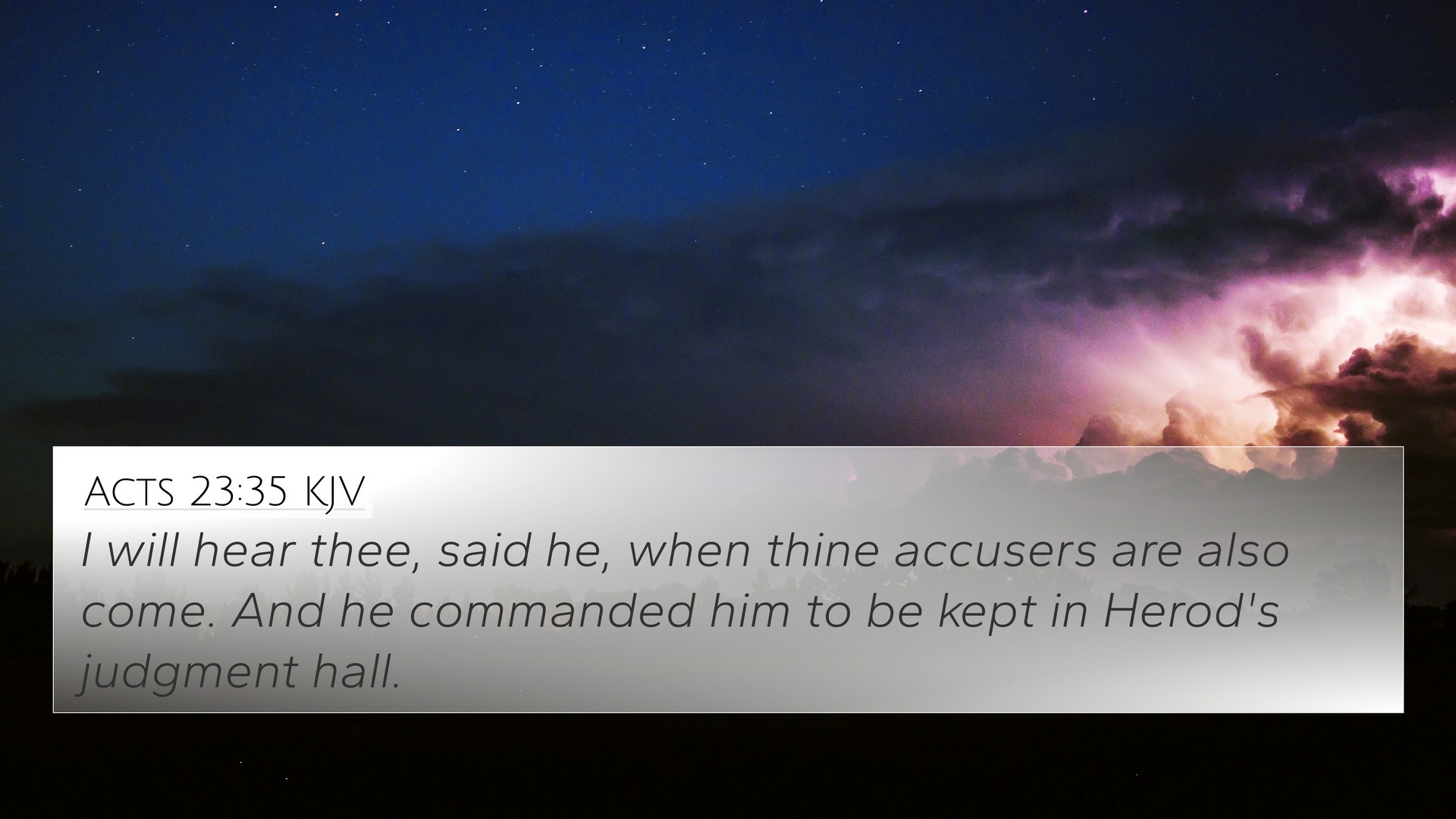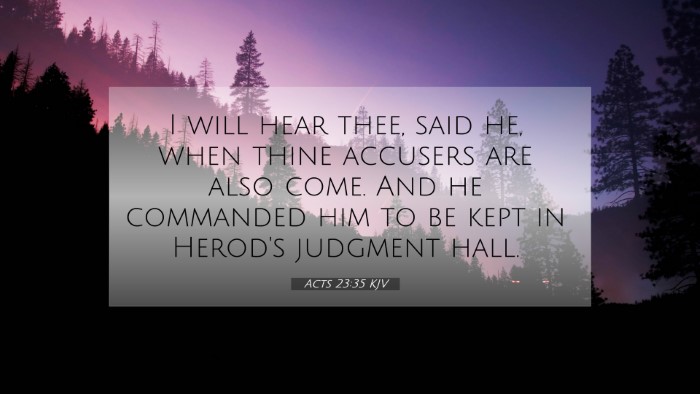Understanding Acts 23:35
Acts 23:35 states: "And he said, I will hear thee, when thy accusers are also come. And he commanded him to be kept in Herod's judgment hall." This verse holds significant meaning within the broader narrative of the Acts of the Apostles and serves as a critical moment in the legal proceedings against the Apostle Paul.
Summary of Acts 23:35
This verse exemplifies the procedural justice in the face of political and religious turmoil. Paul, who was accused by the Jewish leaders, is assured that he will receive a fair hearing. The reference to being kept in Herod's judgment hall underscores the imperial authority over the proceedings and symbolizes both the protection and confinement of Paul.
Commentary Insights
Insights from several public domain commentaries highlight the underlying themes and implications of this verse:
-
Matthew Henry:
Henry emphasizes that Paul is under the protection of the Roman authorities. His placement in Herod's judgment hall suggests a temporary pause in his trials, indicating that the governor appreciates the complexity of the situation. It illustrates both the power dynamics at play and the providence of God in using Roman law to shield Paul from mob violence.
-
Albert Barnes:
Barnes notes the importance of having an orderly trial. He points out that the governor's command to allow both accusers and the accused to present their case reflects a fair legal approach, aligning with the ideals of justice. Furthermore, the reference to Herod's judgment hall suggests that Paul was treated with respect, even as a prisoner, which contrasts sharply with the actions of the Jewish leaders seeking his life.
-
Adam Clarke:
Clarke highlights the political implications of the verse. He suggests that the Roman officials recognize the precarious position of Paul, caught between Jewish law and the authority of Rome. By keeping Paul under guard, the officials are ensuring both his safety and the maintenance of order within the province. Clarke emphasizes that this moment was divinely orchestrated for Paul’s eventual testimony before kings and leaders.
Related Bible Cross-References
Acts 23:35 is thematically and contextually connected to several other Bible verses that help to deepen our understanding:
- Acts 25:11-12: Paul appeals to Caesar, highlighting his rights as a Roman citizen.
- Romans 13:1-4: Discusses the role of governing authorities, pertinent to Paul's appeal for justice.
- Philippians 1:7: Paul expresses gratitude for his partnerships in the gospel, contextualizing his plight.
- 2 Timothy 4:16-17: Paul reflects on his experiences of standing trial and how he was supported by God.
- Acts 21:33-34: The Roman commander seizes Paul to protect him, establishing a motif of Roman intervention.
- Luke 23:6-7: Jesus' trial also reflects the judicial proceedings under Roman authority.
- Matthew 10:16: Jesus advises his disciples to be wise as serpents among wolves, correlating with Paul's wisdom in navigating his circumstances.
Thematic Connections
The thematic connections between these verses can be analyzed to reveal patterns and motifs prevalent within the scripture:
-
Judicial Processes:
Acts 23:35 serves as an example of the legal framework that governs the early church, especially concerning rights and protections available to believers.
-
Divine Providence:
Each reference speaks to God’s hand in protecting his servants, affirming that earthly authorities can be used to fulfill divine purposes.
-
Persecution and Faith:
The cross-references illustrate the trials faced by early Christians, showing how hardship is often met with grace and resilience.
How to Use Bible Cross-References
Utilizing cross-references is an effective method for deepening one’s understanding of scripture. Here are some tools for Bible cross-referencing that can be helpful:
- Bible Concordance: A reference tool that lists words and phrases in the Bible, helping you find related verses quickly.
- Bible Cross-Reference Guide: Several editions include parallel verses within various translations to illustrate connections.
- Cross-Reference Bible Study: Engaging in a study that emphasizes related passages enhances comprehension of themes and doctrines.
- Bible Reference Resources: Utilize these to find links and comparisons between different books of the Bible.
Conclusion
Acts 23:35 is more than just a moment in the narrative of Paul’s trials; it reveals the fascinating interplay between faith, justice, and divine oversight. Exploring related passages through effective cross-referencing can reveal rich insights and a deeper understanding of the themes represented throughout scripture.














